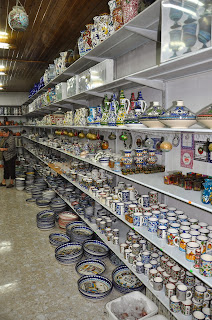First, a correction: in yesterday's blog about Al Mada, Reem's remarkable music program, I misspelled her husband's name, which is spelled Odeh Turjman, not the way I spelled. My apologies to Odeh and Reem.
 |
| Rafat |
 |
| I've got rhythm |
Rafat's options are limited. There is little if any meaningful work right now in Occupied Palestine, aside from the international NGO's in Ramallah. His best hope for meaningful work here is to be hired in Israel, and that requires at least a BA, hustle and a break or two. For now, he works about twenty hours a week in a store, to help pay the bills while he is studying and give him a little pocket money. The rest of the time he is in class or studying. He wonders about getting an Israeli passport so he can travel easily, but his friends tell him not to: "Then you'll be an Israeli, not a Palestinian." I tell he'll be a Palestinian with an Israeli passport but that's a fine distinction here.
A year or two ago, he flew to Italy to visit his brother who is studying there. On his way home, he transited in Rome. When he entered the terminal, he was taken to a room with his baggage and told he had to stay there until his flight was ready. He protested that he needed to go to the bathroom, walk around, stretch his legs. He convinced them so they told him to leave his luggage in the room and had "a minder" follow him until he returned to the room to wait for his flight. He said that was fine and out he went, followed every step of the way until he returned to the room where he was searched again before being led out to board the flight home. A dangerous man, this Palestinian!
s |
| So do I! |
Her focus today was making music for a story they had collectively written the day before. Today's workshop was the third of five she has with this group, introducing them to using art, music, storytelling and theater with kindergardeners. She gave each a copy of true story, which she had typed for them, then it to read them. It's a tender tale of a boy who is frightened by shooting, runs to his grandfather in tears and his grandfather takes him into his house and calms him by telling him the sweet story of how he and the boy's grandmother met, fell in love and married. By the time he has finished, the shooting has stopped and the boy is calm and happy. A story of hope in the midst of conflict.
Then Khitam got the group to experiment with sounds, using their voices and and their hands to
create complementary sounds, one starting, then others joining around a circle until they had a sound symphony. Then she introduced simple instruments and noise makers and they experimented with sounds using them, again adding sounds around a circle for a more complex sound symphony. Once they had created some interesting sounds, she divided them into four groups of five and told them to create a song for the story in half an hour. After they had created their sounds, she brought them back together and each group sang and played its song. The songs were terrific and served the story.
 |
| Here's our song... |
After each song, she asked the performers how they felt, what they'd learned. Most of the comments spoke of being surprised they could come up with a song in half an hour; they were proud of what they'd done. It was fun. They were also surprised they could play and sing it together, after such a short time and do it well. Some spoke of their song's reminding them of their pride in being Palestinian from a village in old Palestine, the one their family had to leave, a village like the one in the story.
 |
| …and here's ours... |




































